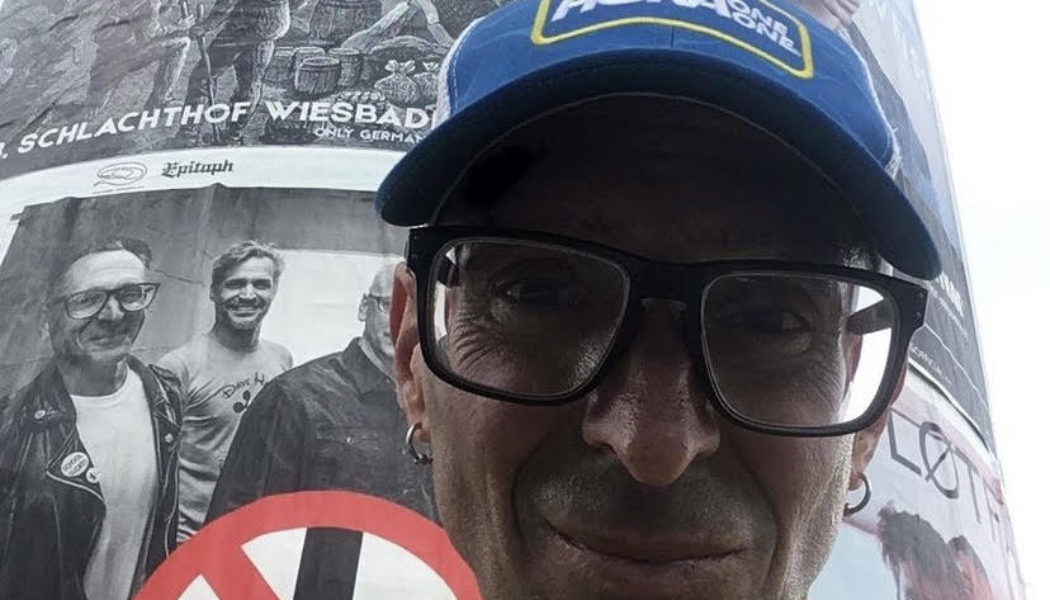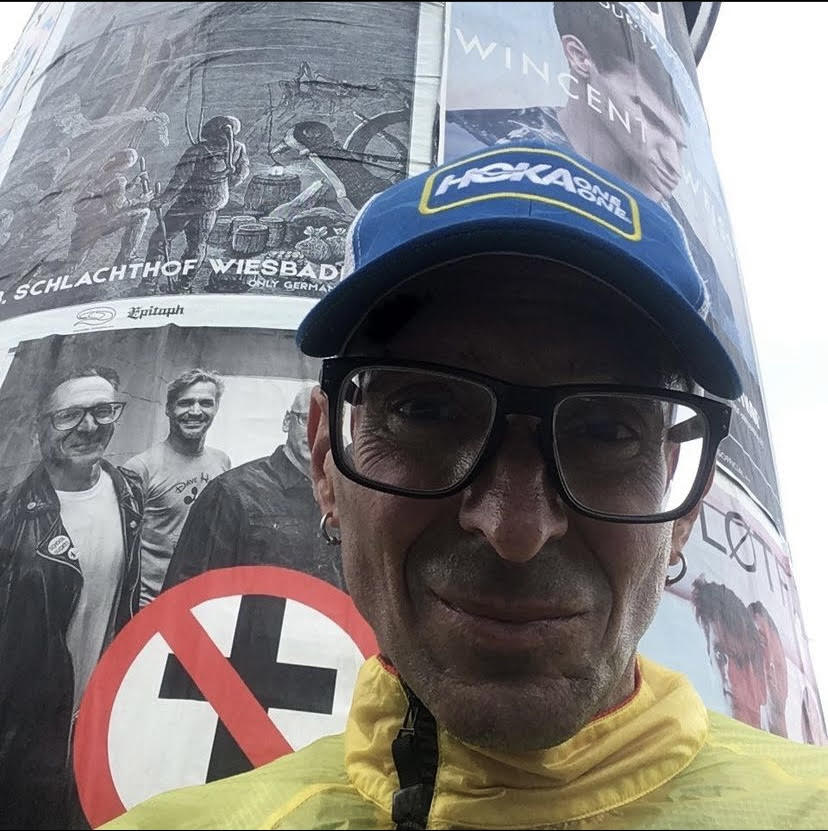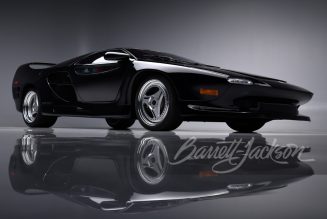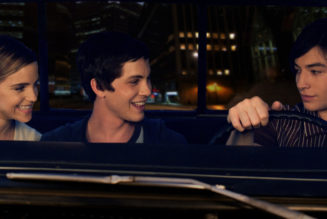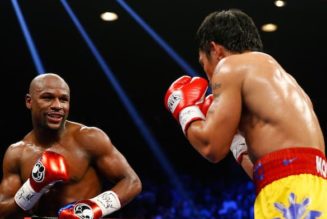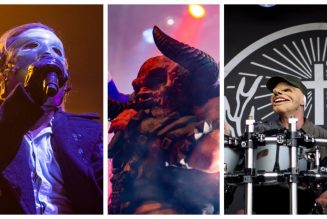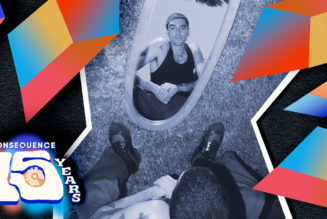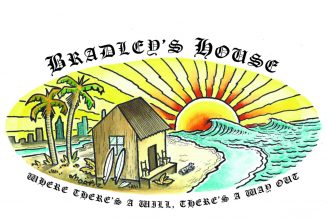There’s something so exceptionally liberating about running. No matter where you may be in the world, all you need is a decent pair of footwear and you are free to explore wherever the fuck your restless limbs and whims take you.
There is also something that’s very punk rock about the sport/obsession as well. Maybe it’s that DIY attitude when navigating local streets, trails and/or alleyways, taking whichever corner or direction that pulls you in that moment. Or maybe it’s the empowering sovereignty to choose your own route and destiny, without any walls or shackles to keep you contained or hold you back. Maybe that’s why running has become the passion of many musicians who wave the punk flag, resonating with those who have experienced the natural buzz and benefits of this beautifully simple exercise in both their personal and creative lives.
Nearly 20 years ago, I fell in love with running. I finally found a therapy that not only gave me literal physical freedom, but helped liberate me from (or at least pacify) the ruthless and relentless demons of Tourette’s Syndrome and depression, fortifying my then-fragile mental health with more impact than any of the meds I was on. I was energized to see its parallels with punk rock, not to mention it being the perfectly provocative and upbeat soundtrack I needed when the run got tough. But if you look back to the ’80s, that connection existed when artists like Joe Strummer smashed hedonistic and self-abusive punk stereotypes by running in the London and Paris marathons – and with a sweaty mohawk, of course. Those cliches unraveled even more so with the health-conscious Straight Edge and positive mental attitude (PMA) movements sweeping a more diversified overall scene, re-educating the world that punk rock wasn’t just about partying and mosh pits. (And you’re arguably just as sweaty after a half marathon as you are emerging from a lively mosh pit.)
You also see musicians such as Riley Breckinridge from post-hardcore giants Thrice “reviewing” music on his regular, Southern California runs as well as Bad Religion guitarist Mike Dimkitch who maintains insanely high levels of both musicianship and fitness; the 53-year-old continues to tackle monumental distances of more than 100 kms (62 miles – he actually runs more than 125 miles on tour), crossing the finish line of more than 20 marathons and more than 20 ultra marathons since he started in the ’80s.
“When I got frustrated with music, I got more nose-deep into marathoning,” Dimkitch explains. “I was in a band, I had a record deal…you really are at the whim of the higher-ups. But when you’re running, it doesn’t matter.”
“It’s punk rock in that it’s totally up to you,” he continues. “If you run a marathon, it’s all about your training, what routes you ran…it’s not about some higher ups who can influence or impact how you do. You’re not going to get pulled out of the race because your shorts aren’t a cool color.”
In the ‘90s when anarcho-punk-folk-pop-turned-surprise-mega-hit-makers Chumbawamba finally got the international attention they deserved after unleashing the immortal beast that is “Tubthumping,” the band’s guitarist Buff Whalley also found solace in hitting the routes of wherever they were playing that day.
“It’s helped my music massively,” says Whalley, who not only spends his days running the hills around his Yorkshire home in the UK, but also composes music for operas, musicals and theater productions – he also created/pioneered a punk-choral group called the Commoners Choir. “When [Chumbawamba] started touring Europe, we spent a lot of time in vans and then buses. I discovered running right at the end of the 1980s and immediately realized that off-road running was a really good balance to spending all day in vans and then all night in venues drinking beer until 3 o’clock in the morning. Running helps you face the rock-and-roll madness.”
Whalley’s a passionate hill (or fell) runner who has also written about the subject in the past – he has a new book, titled Faster! Louder!, which is about a British punk rocker who became the top fell runner in Britain. He says there’s something beautiful in the sport’s self-empowering ethos of individual autonomy, which is also a major note in the three-chord truth of punk rock.
“When I got into punk, you didn’t have to be brilliant – all you had to think was, ‘I want to do that,’ and you just did it.” he says. “Running’s like that.”
Whenever I travel to a new locale, I’ve found that the best way to experience the area is to dig out my runners and explore the routes available. Apparently, musicians are the same, exploring whichever city they happen to be playing at the time via their own two feet. Out of the many countries Bad Religion has played in since he joined the band in 2013, Dimkich says that one nation stands out for the best running.
“Germany,” he says after some thinking. “It’s the most navigable for running because every city is built on a river and they have an amazing cycling infrastructure. So, you’ve got these great, crushed-dirt canal paths along the river and you can run endlessly because it’s not on concrete.”
“Switzerland,” says Whalley when asked the same question. “Those mountains are unlike anything we’ve got in Britain. You just look out the tour bus window and you will probably see a mountain and then you’re like, ‘Great, that’s where I’m running today and life is good.’”
